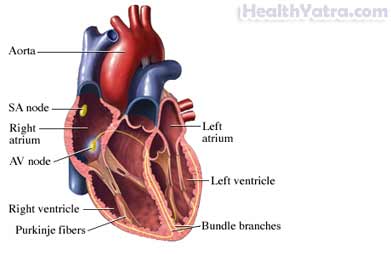परिभाषा
The heart is made up of four chambers. The two upper chambers are the atria and the two lower chambers are the ventricles. The sinoatrial (SA) node, located near the top of the right atrium, produces electrical signals that are sent to the atrioventricular (AV) node. The AV node then sends the signals to the ventricles, which are the primary pumping chambers of the heart. The electrical signals are transmitted smoothly from the atria to the ventricles, causing rhythmic muscle contractions that pump blood to the rest of the body.
There are three types of heart block, ranging from mild to serious:
- First-degree heart block—This is the mildest form of heart block. In this case, the electrical signals from the SA node move more slowly than normal to the AV node, but all signals reach the ventricles. There are usually no symptoms, and heartbeat and rhythm are normal. This type of heart block is often found in well-trained athletes.
- Second-degree heart block—A second-degree heart block means that some of the electrical signals are not reaching the ventricles. This causes dropped beats. There are two types of second-degree heart block:
- Type I second-degree heart block, also called Mobitz Type I or Wenckebach’s AV block—The electrical signals become increasingly delayed with each heartbeat, causing a beat to be missed.
- Type II second-degree heart block, also called Mobitz Type II—In this type of heart block, some of the electrical signals do not reach the ventricles. This is less common, but more serious.
- Third-degree, or complete, heart block—This is the most serious type of heart block. In this condition, no electrical signals are able to reach the ventricles. The ventricles compensate by contracting on their own, but at a much slower rate than is safe for the heart to maintain full function.
Third-degree heart block is very serious and requires immediate care from your doctor. First- and second-degree heart block should be diagnosed by your physician, who will help you determine the best course of treatment, if any.

का कारण बनता है
Heart block often occurs when there is underlying heart disease. The causes of heart block include:
- History of heart disease, such as myocardial infarction, congestive heart failure, valvular problems, and endocarditis
- Hereditary heart defect
- Use of certain types of medications, such as:
- Beta blockers
- कैल्शियम चैनल अवरोधक
- डिजिटालिस
जोखिम कारक
Factors that increase your chance of developing heart block include:
- History of heart disease
- Use of medications such as beta blockers, calcium channel blockers, or digitalis
लक्षण
If you experience any of these symptoms, do not assume it is due to heart block. These symptoms may be caused by other, less serious health conditions:
- चक्कर
- बेहोशी
- छाती में दर्द
- सांस लेने में कठिनाई
निदान
Your doctor will ask about your symptoms and medical history. A physical exam will be done. You may be referred to a cardiologist or arrhythmia specialist.
आपके हृदय की जांच की जा सकती है. इसके साथ ऐसा किया जा सकता है:
- इलेक्ट्रोकार्डियोग्राम (ईसीजी)
- इकोकार्डियोग्राम
उपचार
The course of treatment will depend on the type of heart block you have. Generally, treatment is not necessary for first-degree heart block.
Talk with your doctor about the best treatment plan for you. A pacemaker may be inserted for some cases of second-degree heart block, and all cases of third-degree heart block. A pacemaker is a device that generates electrical signals to stimulate heart muscle contractions. .
If you are diagnosed with heart block, follow your doctor’s instructions .
रोकथाम
To help reduce your chances of getting heart block, take the following steps:
- Obtain treatment for any condition that may cause heart problems or heart disease. This will help prevent heart block.
- If possible, avoid medications that can cause heart block, such as beta blockers, calcium channel blockers, and digitalis.
- Maintain a healthy weight and lifestyle. Get regular exercise, eat a heart-healthy diet, and minimize stress.
- Avoid excessive consumption of alcohol and caffeine.
- धूम्रपान बंद करें।
